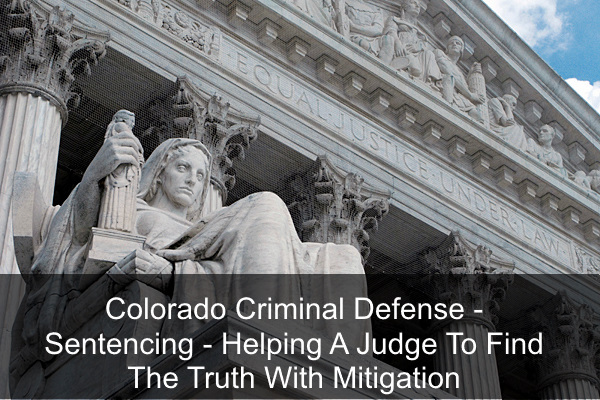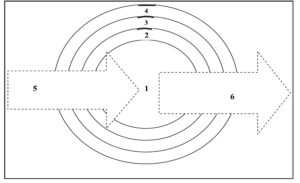




Colorado Criminal Defense – Sentencing – Helping A Judge To Find The Truth With Mitigation
By H. Michael Steinberg Colorado Sex Crimes Criminal Defense Lawyer – Attorney
 Colorado Criminal Defense – Sentencing – Helping A Judge To Find The Truth With Mitigation – “Humanizing” your client to the District Attorney at the plea bargaining stage, and to the Judge at the sentencing phase, is commonly called presenting “mitigation” in a case. Presenting mitigation is a skill that is the result of many years of experience. It is not the focus of many criminal defense lawyers, but is often the most critical stage in a Colorado criminal case.
Colorado Criminal Defense – Sentencing – Helping A Judge To Find The Truth With Mitigation – “Humanizing” your client to the District Attorney at the plea bargaining stage, and to the Judge at the sentencing phase, is commonly called presenting “mitigation” in a case. Presenting mitigation is a skill that is the result of many years of experience. It is not the focus of many criminal defense lawyers, but is often the most critical stage in a Colorado criminal case.
| “One of the most important advances in criminal defense work over the last 40 years has been the evolution of skills, tactics and techniques to contextualize criminal behavior through mitigation narratives. “ |
“Telling The Client’s Story”
In the criminal justice system, the Defendant is often objectified as the crime, and not a person.
It is the Colorado criminal defense lawyer’s duty to “humanize” the Defendant – to prove to all involved that he or she is a person with a personal history. The lawyer’s duty is to give context to the case – to go beyond the immediate facts – to add a realistic, intellectual framework to justify a more lenient plea agreement or sentence.
Criminal defense lawyers most often focus on what seems probable about the case and not about what is possible in a case.
Understanding “Personal Mitigation”
Developing personal mitigation means examining:
- The Defendant’s past;
- The Defendant’s circumstances at the time of the criminal offense;
- The Defendant’s response to the criminal offense and to the prosecution of the case;
- The Defendant’s present and future.
Developing personal mitigation for the Sentencing Judge plays a critical role in the sentencing decision. Many times it can make the difference between probation and prison.
Judges factor in personal mitigation as relevant to the sentencing decision in the majority of cases that come before them for sentencing. in fact, personal mitigation is usually the major factor which pulls a sentence back from immediate remand to custody – or, if a jail or prison sentence is inevitable, it can lead to a shorter jail or prison sentence. The use of legal, social science, and behavioral science research can help tell the story of a Defendant’s life in a way that makes sense.
A multi-disciplinary approach to developing and crafting a cogent strategy through effective storytelling and theme-building can be amazingly helpful to defend the accused at every stage of the criminal case.
The Mitigation “Packet”
The goal of the Colorado criminal defense lawyer is to use the history of a Defendant to create individualized sentencing plans – plans that can focus on substance abuse and mental health treatment, victim restitution, community supervision, the avoidance of future misconduct, and appropriate and constructive consequences.
The mitigation “packet” should begin with an exhaustive and meticulous investigation of the client’s childhood, upbringing, education, relationships, friendships, formative and traumatic experiences, personal psychology, and present feelings. That investigation is then rewritten into a coherent narrative that helps bring to life the person charged. This can be called a “life history chronology”
Experienced criminal defense lawyers must have, or find, the tools to identify key mitigation evidence in a case and to use that evidence to paint a compelling portrait of the Defendant at sentencing. The objective is to identify helpful patterns or “mitigating themes” in a Defendant’s life and to compose a “mitigation narrative” through which the Defendant’s life is made real to the sentencing judge.
Mitigation Factors Must Be Carefully Selected
Because alert prosecutors can turn mitigation around on a Defendant – the mitigation factors selected must be carefully chose as they can sometimes “cut both ways.” Colorado criminal defense lawyers should direct their energies to building a theme not a “tally” from a list of mitigating factors. The presentation must be organized and thoroughly analyzed for flaws and to avoid “turnarounds.”
The mitigation “narrative” must not only be “accurate” and “credible,” it must resonate with this Judge in this case. It should present a “multi-dimensional” view of the Defendant and offer the Judge a viable alternative to the District Attorney’s prosecution’s portrayal of the Defendant as evil.
The mitigation narrative should measure a Defendant’s life in totality and not by the crimes charged.
It must always be framed with the relevant sentencing laws that apply to the given case. The mitigation narrative focuses on the placement of things and events within a life story that is free of legal jargon and rich in detail, imagery, and emotion.
What Then Is A Good Mitigation Plan?
A Good Mitigation Plan Is Realistic And “Informed”
The experienced criminal defense lawyer knows that acknowledging and dealing with the “bad facts” of the case is critically important to developing a successful mitigation plan. The lawyer must understand all, of the “downsides” of a case, and then, after understanding those bad facts – then turn to ‘marshaling” the good facts in a logical and coherent way.
A Good Mitigation Plan Is “Creative”
A skillful criminal defense lawyer will weave a mitigation narrative that gives life to the routine “formulaic mitigation” that most lawyers reserve for their sentencing arguments. A mitigation narrative, to have an impact, must contain to contain facts and evidence that is out of the ordinary, but genuine, and must engage the Colorado sentencing Judge.
It must be relevant, concise, well-informed and realistic. It should not be repetitive, or lack clarity. Bullet points can be used to summarize the argument to make certain it is organized and succinct.
Mitigation Narratives Can Be Organized Into Six Categories
One way to view the categories of mitigation plans – is to place them into six categories. These are:
1. Factors relating to the criminal act, including harm caused to any victim(s);
2. Factors relating to the immediate circumstances of the criminal offense;
3. Factors relating to the Defendant’s wider circumstances at the time of the criminal offense;
4. Factors relating to the Defendant’s responses to the criminal offense and prosecution;
5. Factors relating to the Defendant’s past;
6. Factors relating to the Defendant’s present and future;
Summary Lists Of Specific – Actual Mitigation Factors
What follows is a summary list of the major mitigating factors:
Category: 1
A lack of seriousness / impact of the criminal offense.
The Defendant played a minor role in relation to others in the commission of the offense.
The Defendant received ‘rough justice’ during the criminal act.
The Defendant acted under pressure from / on behalf of others involved in the commission of the crime.
The Defendant acted under a highly provocative act or threat.
The Defendant was highly emotional or distressed during the commission of the crime.
The Defendant lacked an understanding of the criminal offense.
The criminal act was spontaneous and opportunistic and not planned.
There was never an intention to cause harm.
The commission of the crime was an aberrant “error of judgment.”
Category 2:
The Defendant is very young.
There was a pressing personal or family need underlying the crime.
The Defendant is particularly vulnerable, immature and or naïve.
The Defendant suffers from psychiatric illness or other mental health problems.
Category 3:
There were much wider factual circumstances that are not apparent from the criminal offense.
The Defendant has faced up to and now understands his criminal behavior.
The Defendant feels and has expressed sincere remorse.
The Defendant has addressed his problems while in custody.
The Defendant has fully cooperated with the authorities.
The Defendant has written a heartfelt letter to the Judge and the victims of his crime.
The case has taken a long time to get through the Courts and the Defendant has lost much – (e.g. his employment and reputation).
Category 4:
The Defendant has had a positive response to the criminal crime and to the prosecution.
The Defendant is of good character.
The Defendant has led a productive and worthwhile life.
The Defendant has shown general improvement in his behavior.
The Defendant led a difficult and deprived life to this point.
While the Defendant may have a prior criminal history, he has engaged well with previous community punishment.
Category 5:
The Defendant’s past is relevant.
The Defendant has addressed and is addressing drug and / or alcohol problems.
The Defendant has addressed and is addressing his family responsibilities.
The Defendant is unlikely to re-offend or cause additional harm.
The Defendant has a supportive family and or supportive significant other.
The Defendant is currently training for new or existing employment and has good prospects for the future.
The Defendant has submitted character letters.
Category 6:
The Defendant’s present and future is optimistic and full of hope.
The sentence to be proportional and consistent should be lenient when compared to other crimes and sentences (especially with relation to co-Defendant’s, if any).
An long custodial or punitive sentence is not warranted.
The Defendant’s performance on bond has been exemplary.
A More Specific List Of Possible Mitigating Factors Can Be Drawn From This List (some duplication)
Defendant’s Age – whether the Defendant was an adult or minor at the time of the crime.
Mental capacity – such as the Defendant’s intellectual disability, or mental state at the time of the crime.
History of Abuse – whether the Defendant has a history of being abused.
No Criminal Record – this usually refers to a criminal history as an adult, but very serious offenses as a minor may be considered an aggravating circumstance.
Victim Culpability – the victim willingly took part in the crime or other events, which may have led to the crime.
Unusual Circumstances – the Defendant’s actions were due to temporary emotional stress or severe provocation.
No Harm Done – the actions of the Defendant were somehow justified, and did not cause harm to another person.
Necessity – the Defendant committed the crime out of necessity.
Remorse – the Defendant clearly shows he is remorseful for his actions.
The Defendant was influenced by drugs or alcohol,
There were substantial grounds tending to excuse or justify the Defendant’s criminal conduct, though failing to establish a defense.
The Defendant believed he had a claim or right to the property taken, or for other reasons mistakenly believed his conduct was legal.
The Defendant was motivated by a desire to provide necessities for his family or himself.
The victim provoked the crime to a substantial degree, or other evidence that misconduct by victim contributed substantially to the criminal episode.
The Defendant’s criminal conduct neither caused nor threatened serious physical harm to another.
The degree of property loss, personal injury, or threatened personal injury was substantially less than is characteristic for the crime.
The Defendant’s criminal conduct was the result of circumstances unlikely to recur – the character, habits, mentality, propensities, and activities of the Defendant indicate that he is unlikely to commit another crime.
The Defendant has an excellent employment record.
The Defendant’s educational background, home life, sobriety, or satisfactory social adjustment recommends leniency.
There is documentation from the schools; witnesses; letters; public records; news clips; certificate of honorable discharge – all demonstrate excellent character.
There is a strong possibility of a return of the Defendant to a normal life in the community.
The Defendant has the capacity to adjust to law abiding behavior
There is a strong possibility of successful treatment or training of the Defendant
There are solid prospects for rehabilitation of the Defendant.
The Defendant is likely to comply with the terms of probation.
The Defendant is repentant and contrite.
The conduct of the Defendant between the offense date and sentencing date has been exemplary.
The Defendant immediately – by his plea – has aided in avoiding delay and took responsibility for his crimes.
The Defendant’s self-analysis of why he did what he did is insightful and promising.
The Defendant is ready and willing to pay restitution to compensate the victim.
A shorter sentence is likely to allow the Defendant to take his place in society as a useful citizen at the earliest time consistent with the protection of the public.
The Defendant was confined for a considerable period of time prior to sentencing.
Colorado Criminal Defense – Sentencing – Helping A Judge To Find The Truth With Mitigation
If you found any of the information I have provided on this web page article helpful please click my Plus+1 or the Share buttons for Twitter and Facebook below so that others may also find it.
The reader is admonished that Colorado criminal law, like criminal law in every state and at the Federal level, changes constantly. The article appearing above was accurate at the time it was drafted but it cannot account for changes occurring after it was uploaded.
If, after reading this article, you have questions about your case and would like to consider retaining our law firm, we invite you to contact us at the Steinberg Colorado Criminal Defense Law Firm – 303-627-7777.
Never stop fighting – never stop believing in yourself and your right to due process of law. You will not be alone in court, H. Michael will be at your side every step of the way – advocating for justice and the best possible result in your case. H. Michael Steinberg is passionate about criminal defense. His extensive knowledge and experience of Colorado Criminal Law gives him the edge you need to properly handle your case
 ABOUT THE AUTHOR: H. Michael Steinberg – Email The Author at:
ABOUT THE AUTHOR: H. Michael Steinberg – Email The Author at:
A Denver Colorado Criminal Defense Lawyer – or call his office at 303-627-7777 during business hours – or call his cell if you cannot wait and need his immediate assistance – please call 720-220-2277.
“A good criminal defense lawyer is someone who devotes themselves to their client’s case from beginning to end, always realizing that this case is the most important thing in that client’s life.”
You should be careful to make a responsible choice in selecting a Colorado Criminal Defense Lawyer. We encourage you to “vet” our firm. Over the last 40 plus years – by focusing ONLY on Colorado criminal law – H. Michael has had the necessary time to commit to the task of constantly updating himself on nearly every area of criminal law, to include Colorado criminal law and procedure and trial and courtroom practice.
Putting more than 40 years of Colorado criminal defense experience to work for you.
H. Michael works hard to get his clients the best possible results in and out of the courtroom. He has written, and continues to write, extensively on Colorado criminal law and he hopes this article helps you in some small way – Colorado Criminal Defense – Sentencing – Helping A Judge To Find The Truth With Mitigation.

Other Articles of Interest:
- Colorado Sex Crimes Sentencing – The Dangers Of A Deferred Judgement To A Liftetime Sentence
- Colorado Criminal Law – Sentencing – Understanding The Importance of Proper Preparation for the Sentencing Hearing – Some Tips for Arguing for Mitigation Of The Sentence
- Colorado Clergy-Communicant Laws – Can I Tell My Priest, Pastor, Clergy The Truth? – 13-90-107
- Colorado Criminal Law And Trials – Tips On Being a Witness
- Colorado Criminal Law – Mental Illness – Do You Have The Right To Represent Yourself – Waiving The Right To A Lawyer In Colorado













